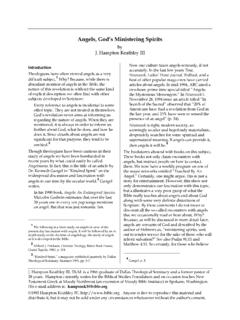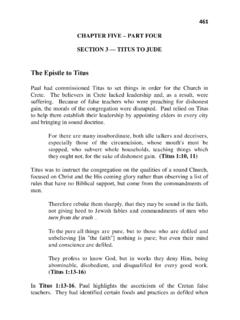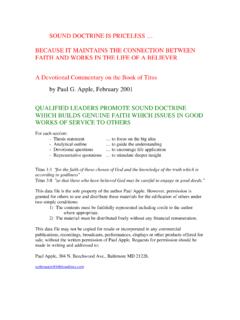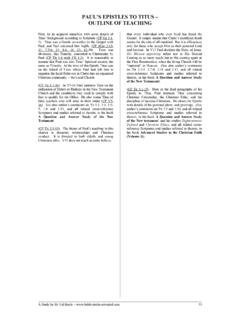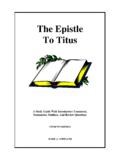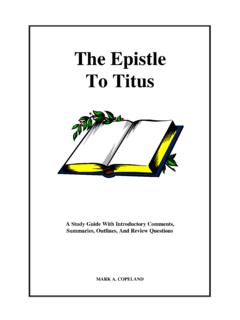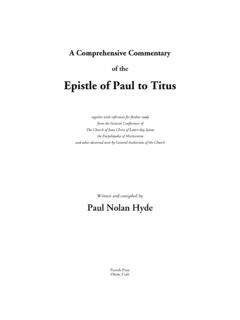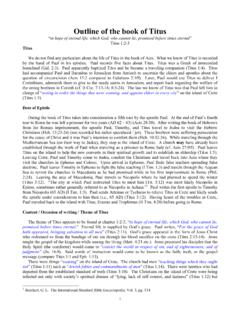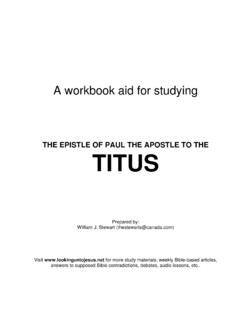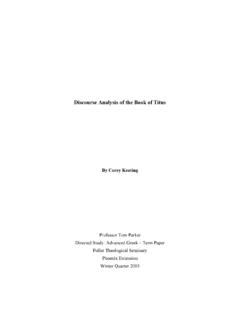Transcription of The Epistle to Titus - gracenotes.info
1 A Grace Notes Bible Study The Epistle to Titus by Warren Doud Grace Notes 1705 Aggie Lane, Austin, Texas 78757 Email: Epistle to Titus Table of Contents Titus PREVIEW .. 5 Introduction to the Study of Titus .. 5 Titus , Chapter 1 .. 6 Titus 1:1 .. 6 Titus 1:2 .. 9 Titus 1:3 .. 10 Titus 1:4 .. 11 Titus 1:5 .. 12 Titus 1:6 .. 14 Titus 1:7 .. 15 Titus 1:8 .. 16 Titus 1:9 .. 17 Titus 1:10 .. 19 Titus 1:11 .. 20 Titus 1:12 .. 21 Titus 1:13 .. 22 Titus 1:14 .. 22 Titus 1:15 .. 24 Titus 1:16 .. 25 Titus , Chapter 2 .. 27 Titus 2:1 .. 27 Titus 2:2 .. 28 Titus 2:3 .. 31 Titus 2:4 .. 32 Titus 2:5 .. 33 Titus 2:6 .. 34 Titus 2:7 .. 34 Titus 2:8 .. 35 Titus 2:9 .. 36 Titus 2:10 .. 38 Titus 2:11 .. 39 Titus 2:12 .. 39 Titus 2:13 .. 41 Titus 2:14 .. 42 Titus 2:15 .. 43 Titus , Chapter 3.
2 44 Titus 3:1 .. 44 Titus 3:2 .. 45 Titus 3:3 .. 46 Titus 3:4 .. 47 Titus 3:5 .. 48 Titus 3:6 .. 50 Titus 3:7 .. 50 Titus 3:8 .. 51 Titus 3:9 .. 52 Titus 3:10 .. 52 Titus 3:11 .. 52 Titus 3:12 .. 52 Titus 3:13 .. 53 Titus 3:14 .. 53 Titus 3:15 .. 53 Topical Studies .. 54 Anger .. 54 Apollos .. 56 Aquila and Priscilla .. 57 Authority .. 58 Circumcision .. 66 Essence of God .. 67 Faith-Rest .. 74 Forgiveness .. 82 Godliness .. 83 Grace .. 85 Heresy and Apostasy .. 95 Hope .. 97 Imputation .. 98 Judgment, Justice, and Judging .. 99 Mental Attitude .. 102 Old Age .. 106 Paul the Apostle .. 108 Preaching .. 111 Propitiation .. 112 Rapture .. 115 Reconciliation .. 117 Redemption .. 117 Regeneration .. 120 Salvation Doctrines .. 121 Servants of God .. 124 Servants and Slaves in Palestine.
3 125 Shepherds of the Flock of God .. 127 Sin Nature .. 132 Sins of the Tongue .. 134 Union with Christ (Positional Truth) .. 135 Appendix A: Bibliography .. 137 Appendix B. On the Date of the Pastoral Epistles .. 137 Titus PREVIEW A reference book that is an essential in any study that involves the Apostle Paul, whether his epistles or his activities and speeches in the Acts of the Apostles, is the masterful history The Life and Epistles of St. Paul , written in the 19th Century by the Rev. W. J. Conybeare, MA, and the Very Rev. J. S. Howson, DD. For what it's worth, this is my all time favorite Christian publication! I have studied the book twice and read parts of it many times. From the first paragraph of Conybeare and Howson s introduction: The purpose of this work is to give a living picture of St.
4 Paul himself, and of the circumstances by which he was surrounded. Actually, they did far more than that modest sentence indicates. Either Conybeare or Howson (or both of them) personally walked and sailed everywhere that the Apostle traveled! Their account is a great travelogue, an historical tour-de-force, and an insightful Christian analysis and examination of Paul's ministry. Included in the book are the authors' own translations from the Greek of Paul's inspired writings! The excerpt below will give you an indication to the depth of thought and careful consideration that went into all their writing. The book used to be published by Wm. B. Eerdmans Publishing Co. of Grand Rapids, Michigan, USA. They have published both hard cover and paperback editions, but they tell me now that it s out of print.
5 The following is from The Life and Epistles of St. Paul , by W. J. Conybeare and J. S. Howson, Appendix II Introduction to the Study of Titus I can't do better than to start off with the brief introduction of Conybeare and Howson to the Epistle to Titus . From The Life and Epistles of St. Paul by W. J. Conybeare and J. S. Howson. From Ephesus he [Paul] soon afterward made an expedition to Crete. It can scarcely be supposed that the Christian Churches of Crete were first founded during this visit of St. Paul; on the contrary, many indications in the Epistle to Titus show that they had already lasted for a considerable time. But they were troubled by false teachers, and probably had never yet been properly organised, having originated, perhaps, in the private efforts of individual Christians, who would have been supplied with a centre of operations and nucleus of Churches by the numerous colonies of Jews established in the island.
6 St. Paul now visited them in company with Titus , whom he left in Crete as his representative on his departure. He himself was unable to remain long enough to do what was needful, either in silencing error, or in selecting fit persons as presbyters of the numerous scattered Churches, which would manifestly be a work of time. Thus, Titus was left at Crete in the same position which Timotheus had occupied at Ephesus during St. Paul's recent absence; and there would, consequently, be the same advantage in his receiving written directions from St. Paul concerning the government and organisation of the Church .. Accordingly, shortly after leaving Crete, St. Paul sent a letter to Titus , the outline of which would equally serve for that of the preceding Epistle [1 Timothy]. But St. Paul's letter to Titus seems to have been still further called for, to meet some strong opposition which that disciple had encountered while attempting to carry out his master's directions.
7 This may be inferred from the very severe remarks against the Cretans which occur in the Epistle , and from the statement, at its commencement, that the very object which its writer had in view, in leaving Titus in Crete, was that he might appoint Presbyters in the Cretan Churches; an indication that his claim to exercise this authority had been disputed. Titus 6 This Epistle seems to have been dispatched from Ephesus at the moment when St. Paul was on the eve of departure on a westward journey, which was to take him as far as Nicopolis (in Epirus) before the winter. [End of Conybeare and Howson quotation.] One of the most interesting and useful features of the Epistle to Titus is what it teaches about the Christian way of life. The letter serves as a succinct outline of the obligations for holy living, devotion to God, and love and graciousness toward other people.
8 The examples of the spiritual character of godly church leaders, gracious and grace-filled Christian senior citizens, and serious and motivated young people, are as clearly drawn here as anywhere else in the Bible. This Epistle is a good place to learn a great deal about God's plan for your life, and why the Lord requires certain thinking and behavior from believers. For example, the young woman of chapter 2 is to be taught certain specific things (by the older woman). The things she learns will certainly help her in her daily life with her husband and children. But the most important thing is that her life be such a testimony that the word of God be not slandered ! Titus himself is told to be an example, that he that is in opposition have no evil thing to say of you . Not that you can keep people from talking, but the idea is not to give them ammunition.
9 They the servant is given commands about his work for his master, to be obedient, not to talk back, not to steal. Why? Not just that he may be a good witness to his employer, but that he may adorn the gospel of the Lord! So, how then am I to live, Lord? If I follow these three principles, that my life brings no disrepute on the Lord, gives enemies no evil thing to say, and decorates the Gospel - well, that's pretty hard to slide around! And suppose you have a decision to make about some activity that you are planning, whether it is in the Lord's will. Just apply the principles of Titus 2 to help make the decision. Does the activity bring slander on God, does it give enemies of the Gospel something to criticize, does it adorn the Gospel ? This makes it a lot easier to make decisions in gray areas.
10 In this study we will take a close view of each word and statement. But there is a near field and a far field approach to the Word of God. We must study microscopically; but we must then zoom out, use our peripheral vision, to see the landscape of the whole context of Scripture. And the memory work I suggested was aimed at helping us keep our minds on the overall context. Here are some of the aims of this Titus series: To learn how Christians are supposed to operate in the Christian life. To see some things about the operation of a local church, such as how church leaders are identified and qualified. To observe how certain serious church problems are handled, particularly involving false teaching and sins of the tongue. To gain an insight into the character, background, and motivation of Christian Jews of the 1st Century, who were struggling mightily with how to correlate their ancient Judaic teachings and practices with the new Christian doctrines they were being asked to consider.


